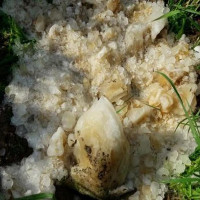More than just a country that found a recipe for yogurt, yogurt pots are part of the history and identity of the Bulgarian people.
In Bulgaria, yogurt – or yogurt – is everywhere. You will be extremely surprised to see it lining up in the supermarket refrigerator.
Yogurt is also an integral part of traditional Bulgarian dishes such as tarator, cold soup, salad… People are always sipping yogurt on the street and dipping a piece of cake into a cup of yogurt in the restaurant.

Tarator – a cold soup made from yogurt, is a popular Bulgarian dish.
“We put yogurt in everything,” says Nikola Stoykov. “I eat three jars a day. The first jar I eat in the morning, then I eat another jar for supper, and another jar before going to bed at night.”
“When I was a kid, my grandmother used yoghurt mixed with fruit jam and told me it was ‘ice cream’, because it was much healthier than an actual ice cream. I was tricked into eating it. yogurt like that, and now it’s a habit.”
“When I was growing up, I was aware of all its health benefits, but that’s not why I eat it a lot. It’s basically part of the Bulgarian way of life.”
Yogurt has a long history in Bulgaria. People here accidentally discovered how to make yogurt about 4,000 years ago. Accordingly, nomads, when transporting milk in animal skins, inadvertently created a perfect environment for bacteria to grow. Milk ferments, and forms yogurt.
Elitsa Stoilova, assistant professor of ethnology at Plovdiv University, confirms: ” Yoghurt has been a part of people’s diet for centuries in Bulgaria. This is a special place in the world, when the bacteria and the temperature are just right for the natural production of yogurt.”

Bulgaria played an important role in making yogurt the ubiquitous product we know today.
However, it was only when Dr. Stamen Grigorov – a Bulgarian scientist discovered the composition of yogurt, that the country began to play an important role in introducing this product to the West.
Grigorov identified the essential bacterium lactobacillus bulgaricus that helps ferment milk. In honor of his discovery, the village of Trun – where Grigorov was born, has become the only yogurt museum in the world.

The only yogurt museum in the world.
When we think of yogurt now, we often think of Turkish, Greek or even Icelandic products. But in the 20s and 30s, due to the focus of the scientific community on Grigorov’s discovery, Bulgarian yogurt was famous above all.
Russian biologist and Nobel laureate Élie Metchnikoff leveraged Grigorov’s work to find a link between Bulgarian farmers who ate a lot of yogurt and their longevity.
The idea that yogurt helps prolong life has fueled a health craze in European countries, such as France, Switzerland, Germany, Spain and the UK. Gradually, yogurt was introduced into the Western European diet.
With increasing demand, yogurt in Bulgaria began to be produced by an industrialized process. Manufacturers have taken rigorous measurements, using specialized equipment to eliminate any microorganisms other than lactobacillus bulgaricus.
Traditional yogurt is made with buffalo milk and sheep milk. Today, manufacturers turn to cow’s milk. It is the result of product industrialization.

Traditional yogurt is made with fresh milk from buffalo or sheep.
Although many people continued the tradition of making yogurt at home, the state takeover of the dairy industry in 1949 led to other changes. An official Bulgarian yoghurt is born, patented, rated and exported by the state, thereby making it a national symbol.
To this day, the company LB Bulgaricum continues to hold and license patents to countries such as Japan and Korea. Interestingly, bacteria that originated in Bulgaria cannot reproduce in other countries. Therefore, Asian companies have to continuously import them.
Since the biologist Metchnikoff’s death in 1989, Bulgaria has lost its position as a yogurt producer. The number of manufacturers has decreased from 3,000 to just 28. This explains why it is not well known in Europe. However, the tradition of making yogurt continues in this country, and is slowly experiencing a revival.

The special feature of Bulgarian yogurt lies in its variety.
“The special feature of Bulgarian yogurt lies in its diversity . It is not a standardized product. If two different villages make yogurt, the result will be different because the milk composition is not uniform. And that’s what attracts tourists with this type of yogurt,” said Stoilova.

